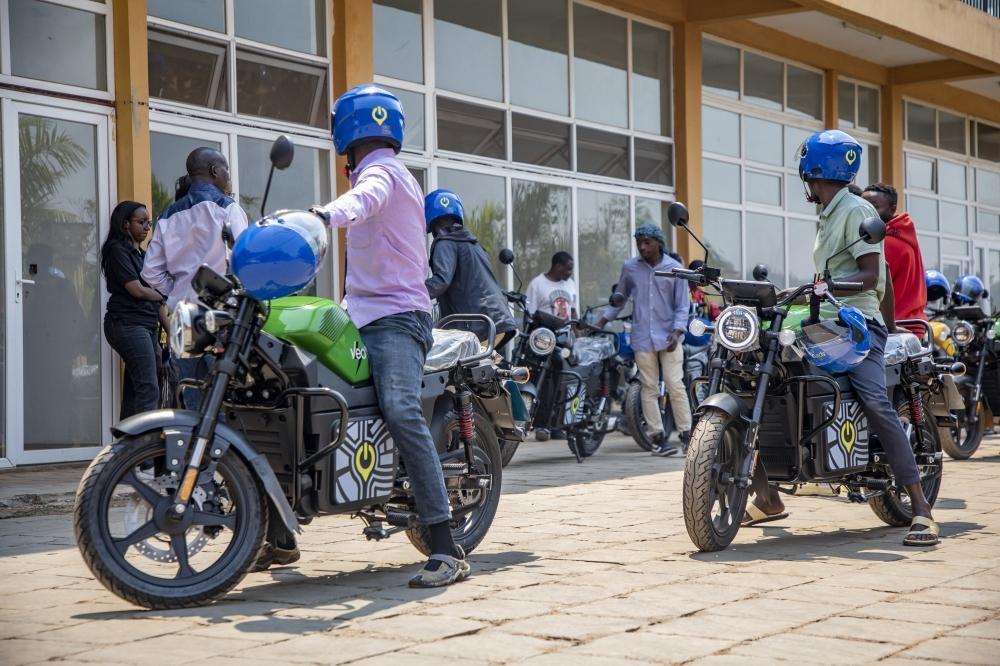Africa-Press – Rwanda. The government will stop registering petrol-powered motorcycles for public transport in the City of Kigali in January 2025, limiting registration to electric motorbikes only, as part of the government’s shift toward sustainable mobility.
The Ministry of Infrastructure confirmed this policy as part of its push for cleaner, greener transportation options.
“We will not register petrol motorbikes for public transport in Kigali. Only electric ones will be considered for commercial public transport,” Jimmy Gasore, Minister of Infrastructure said in an interview with The New Times.
Gasore pointed out the benefits of the initiative, noting that the e-motorbike market and infrastructure are mature enough in Kigali to support this transition.
The minister clarified that the policy does not affect existing petrol-powered motorbikes, which will continue to operate without interruption. “This is why we anticipate no negative economic impact,” he added.
This measure also discourages the importation of non-electric motorbikes for public transport, aligning with Rwanda’s broader e-mobility strategy.
Juliet Kabera, Director General of the Rwanda Environment Management Authority (REMA), emphasised the environmental benefits, noting that electric motorbikes contribute zero emissions.
“There are already many players in the electric motorcycle ecosystem. Electric bikes are both eco-friendly and affordable,” Kabera said, referencing a pilot project in which petrol motorbikes were retrofitted with electric components, replacing engines, exhausts, and chains with electric counterparts.
She advocated for a shift in mindset towards purchasing electric motorbikes, stressing the potential cost savings and environmental impact.
The new policy will allow existing petrol motorbikes to continue operating until they are phased out due to wear and tear, although they will be subject to emissions standards.
In June 2021, Rwanda, in partnership with the United Nations Development Programme (UNDP), embarked on a gradual phase-out of petrol-powered motorbikes by encouraging the conversion to electric alternatives, aiming to cut greenhouse gas emissions and air pollution.
At that time, over 100,000 motorbikes were registered nationwide, with 46,000 operating as moto-taxis, including 26,000 in Kigali alone. These motorbikes significantly contribute to poor air quality and environmental degradation.
A recent study on the impact of scaling up electric motorbikes in Rwanda highlighted potential savings of Rwf9 billion annually due to reduced fuel imports.
Currently, Rwanda spends approximately Rwf23 billion on fuel imports yearly, while electric motorcycles would only require Rwf14 billion annually for electricity, which is domestically produced.
Around 20% of all trips in Kigali are taken by petrol-fueled motorbike taxis, a major contributor to air pollution and greenhouse gas emissions. Rwanda’s Climate and Nature Finance Strategy (CNFS), launched on October 17, aims to cut emissions by 38% by 2030 and proposes measures to attract green investment, such as tax incentives for private sector participation in climate-friendly initiatives.
Suggested incentives include subsidies for electric vehicles, levies on high-emission vehicles, and adjustments to fuel taxes.
To support this transition, Rwanda already offers incentives like zero-rated import duty on electric and hybrid vehicles to promote adoption of electric cars and motorbikes, as part of its commitment to reducing greenhouse gas emissions, according to the Ministry of Finance and Economic Planning.
For More News And Analysis About Rwanda Follow Africa-Press






